Kalium Wordpress Support Uploading Plugins External Source
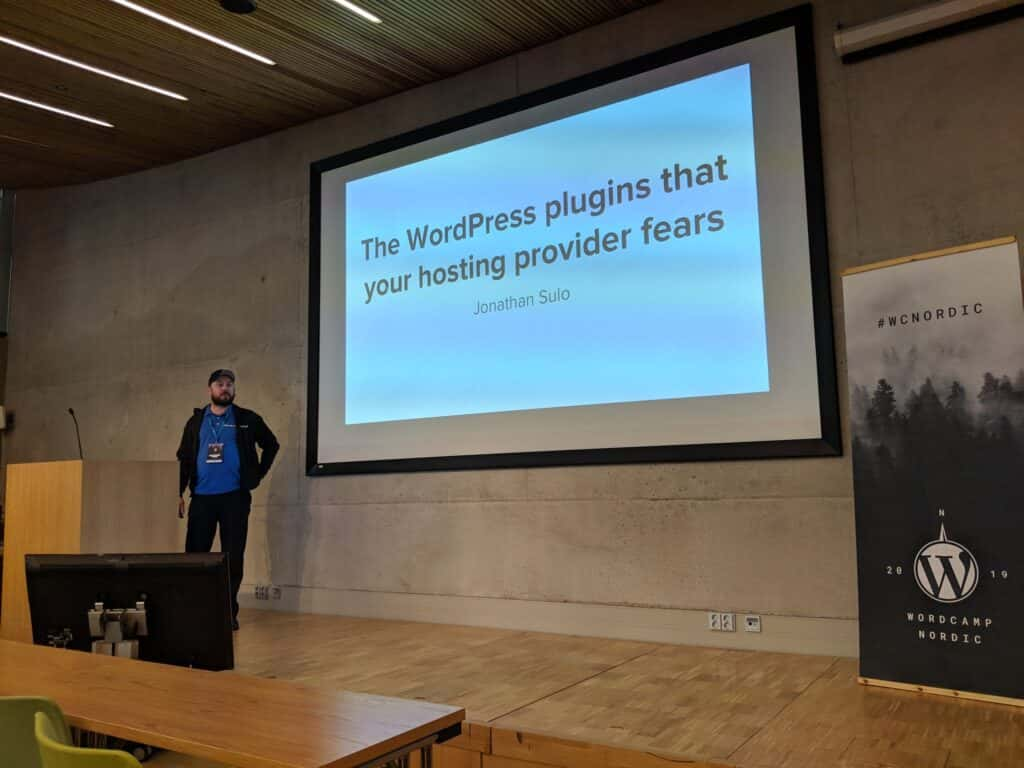
"There's a plugin for that" is a long-time notion in the global WordPress community. In one style it's a positive example of the flexibility of WordPress, only on the other paw information technology has created a mind-set up of "everything should be solved using plugins". We know wearisome WordPress plugins is 1 of the biggest performance killers in the WordPress ecosystem.
The downside to the "in that location'south a plugin for that" mindset is that WordPress sites have become slower than they have to be. In dissimilarity to what some users of other CMSes and static content generators claim, WordPress is not slow. It's what we add to WordPress that makes it slow. For instance plugins.
Earlier this year I gave a talk at WordCamp Nordic in Helsinki, Finland, about some of the most popular WordPress plugins, with the most negative impact on functioning. This is based on my experience with WordPress since 2005, and from my work as a operation expert here at Servebolt.
Here's a video of my talk. More information has besides been added in the mail below.
WordPress is not slow.
It's what we add to WordPress that makes it tedious.
Plugin hygiene
Before you add any plugin to WordPress at that place are a few very important questions you need to ask yourself.
- Do you lot really need this plugin?
- Is the plugin a "must accept" or just a "nice to take"?
- Can it be solved server-side or another style exterior of WordPress (that won't affect the performance of your website)?
Many features found in WordPress plugins can easily be added through small code snippets in your WordPress theme functions.php file, or as a small-scale plugin. And so if you just need 1 feature you usually should not install a large plugin. But similar you don't need to install Photoshop to resize photos.
Many features, similar image optimisation, don't even demand a plugin. Image optimization tin can equally hands be done with server tools similar imagemagick via command line and SSH.
The fact is that every line of code yous add to WordPress will increase your loading times. And all plugins dull down your site, but for some well built or small plugins the performance bear on is negligible.
Some other important thing is to avoid using plugins that "do information technology all", likewise known every bit "swiss army knife plugins". They tend to do a lot of things not that well and add bloat. Since information technology's not the corporeality of plugins that slows down your code just the total corporeality of code that needs to be run, it's much better to add small specialized plugins.
When installing plugins, yous must test your WordPress website both earlier and after. What'south the performance affect of the plugin? Is it worth it? Again, "must take" vs. "nice to have".
Y'all should also check the post-obit:
- If information technology'southward available through the WordPress plugin directory, what's the rating there?
- Check the support forum for the plugin, are at that place many unanswered questions there?
- When was it final updated?
- Is information technology tested with your version of WordPress?
Another dainty thing to check is the history of security vulnerabilities in vulnerability databases like wpvulndb.com.
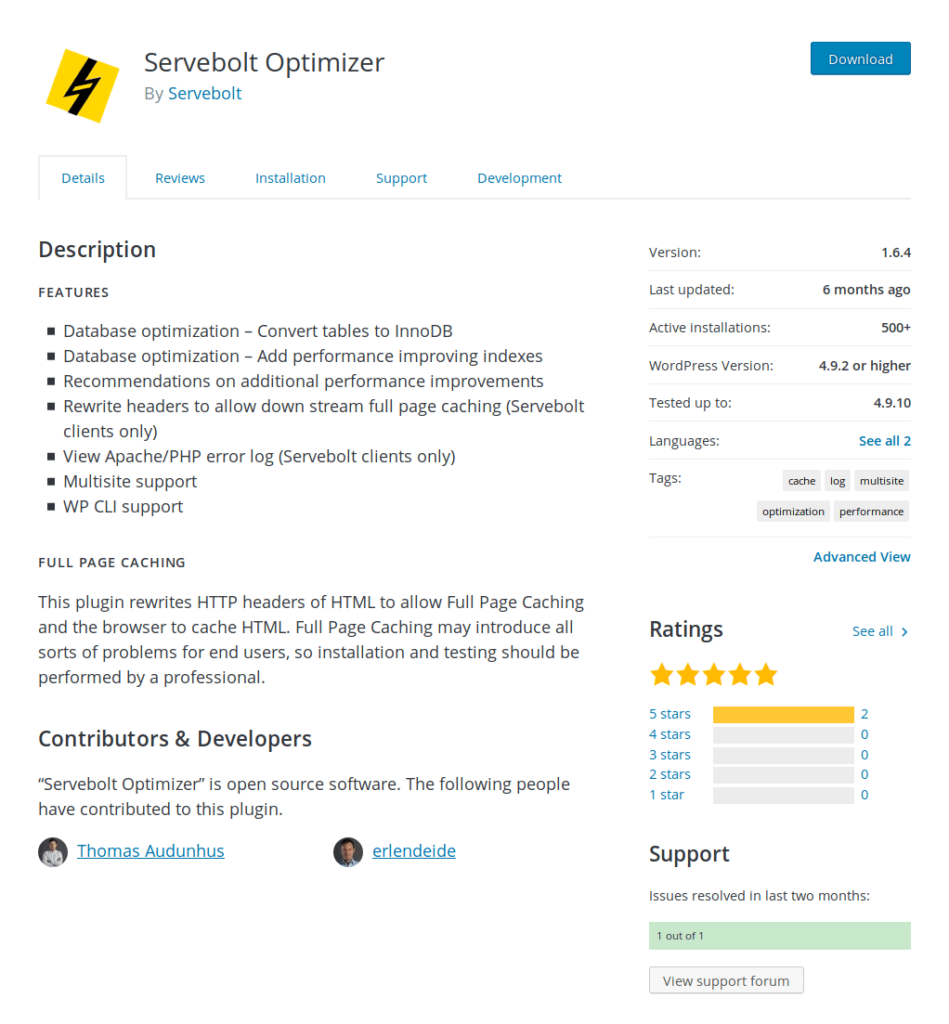
Activate plugins the right way
Running plugins the right way is likewise important. If you take a WordPress network (multi-site), don't activate a plugin for the whole network if it's only going to be used on one website. Activate it for that 1 website only!
Plugins that perform scheduled tasks should of course be setup with server based cron. You lot don't withal utilize WP-cron do you? That's a major functioning killer! Get ahead and switch to server cron with WordPress right away.
Here's how to setup cron the right mode with Servebolt: How to setup WordPress and WooCommerce Cron Jobs
The plugins that hurt your WordPress performance
I've sorted these plugins in unlike categories, along with some amend alternatives. These are not all the bad plugins that exist, I'm afraid at that place's more of them out there, but information technology's some of the most popular ones that we've seen to have a negative touch on performance.
Security
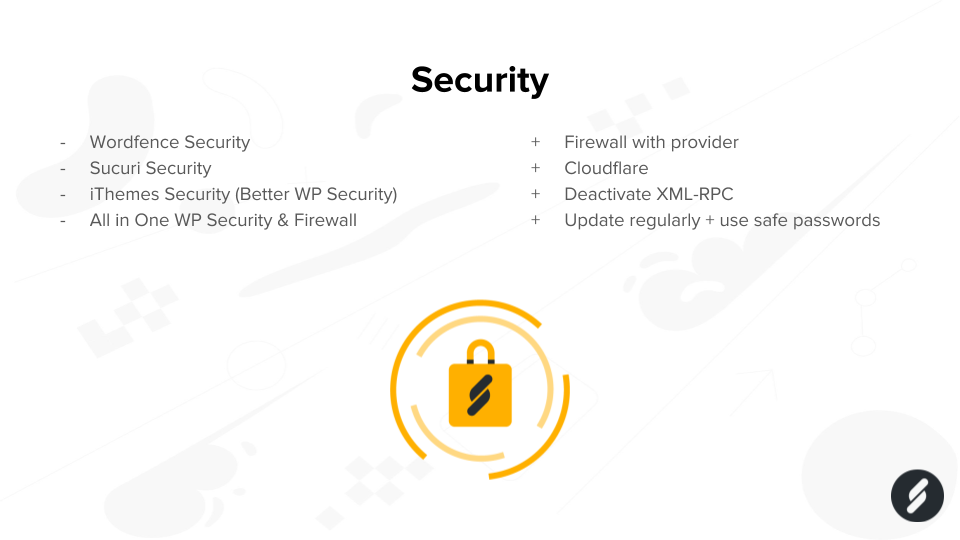
The bad
- WordFence Security
- Sucuri Security
- iThemes Security (Better WP Security)
- All in One WP Security & Firewall
The alternatives
- Firewall with your hosting provider
- Cloudflare
- Conciliate XML-RPC
- Update plugins, themes and core regularly
- Utilize & enforce rubber passwords
Security plugins actually don't add that much security to WordPress. Instead, they tend to give a imitation sense of security. And many times they've independent security holes themselves.
Security plugins touch areas that should not exist touched by a plugin, and they try to exercise way too much. When a security plugin has an error in a role that touches an otherwise harmless expanse, it causes horrible consequences.
Bjørn Johansen
If yous want to stay condom and secure with WordPress, the virtually of import matter is to update WordPress with plugins and themes properly. When WordPress is hacked, information technology's nigh ever due to an insecure plugin.
A firewall with your hosting provider or an awarding firewall with a provider such as Cloudflare is great for protection likewise. They protect websites from known attacks (based on a database with vulnerabilities) even before the attacks hit your website.
Want more tips on security? Read our good friend Bjørn Johansen's blogpost WordPress security for the coincidental blogger or modest business with limited resources.
Folio builders

The bad
- WPBakery (Visual Composer)
- Beaver architect
- Elementor
The alternatives
- WordPress Block Editor (Gutenberg)
- Avant-garde Custom Fields – Flexible Content Fields
Page builders tin can be both a approving and a curse. Sure, they tend to make things a whole lot easier, only they also add together a lot of bloated functions and unnecessary lawmaking. Especially on the frontend. With the recent introduction of the Block Editor (Gutenberg), several page builders take become more performant, but they're yet far from skilful.
Until the block editor is a total-fledged page builder (yes, this volition eventually happen), a combination of Gutenberg and Advanced Custom Fields is the well-nigh performant solution. This is also how we at Servebolt practise page builder on our own website. We use ACF Flexible Content as the page builder, and apply the block editor on blog posts.
Image management
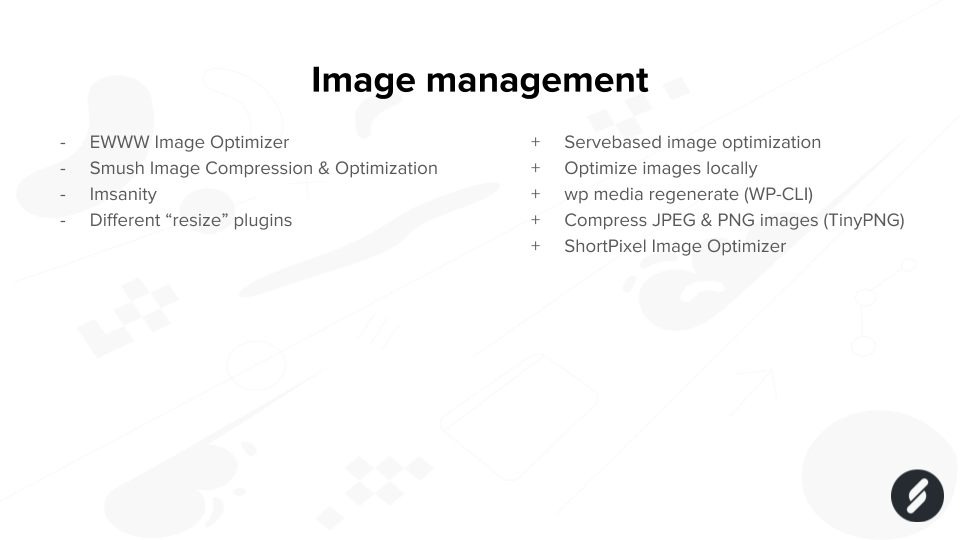
The bad
- EWWW Prototype Optimizer
- Smush Image Compression & Optimization
- Imsantiy
- Various "resize" plugins
The alternatives
- Serverbased image optimization
- Optimize images locally earlier upload
- wp media regenerate (WP-CLI)
- Compress JPEG & PNG images (TinyPNG)
- ShortPixel Image Optimizer
The one thing that usually takes upwardly virtually infinite in a website is the images. So it's a very good thought to optimize the images, to reduce their size and loading time. Unfortunately, many users but install an epitome optimization plugin and call up they're skilful. But they're really not.
We've tested and evaluated many image optimization plugins and to our surprise, many of them are really bad. The plugin with the most negative bear on is definitely EWWW Image Optimization. If yous accept to use a plugin, it's better to use plugins that off-load the optimization.
But better than using plugins is to manage the image optimization either when the images are produced. Export them properly or optimize the images server-side with programs similar jpegoptim, imagemagick and optipng. Note likewise that WP-CLI has some nice epitome tools present!
Broken links and related posts
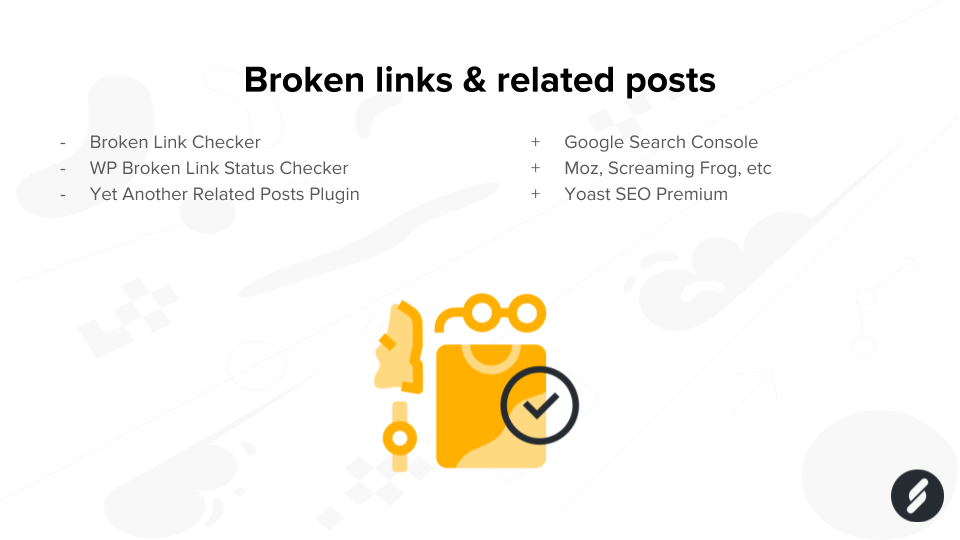
The bad
- Cleaved Link Checker
- WP Cleaved Link Status Checker
- Yet Another Related Posts Plugin
The alternatives
- Google Search Console
- Moz, Screaming Frog, Sitebulb etc.
- Yoast SEO Premium
These are plugins with scheduled tasks that benefit hugely from a proper cron setup, as mentioned to a higher place. All-time of all though is to employ specialized external services, like the Google Search Console and Moz or Screaming Frog.
The related posts office in the premium version of Yoast SEO is besides something nosotros tin recommend. Yoast SEO in general is very good performance-wise these days, then check them out if you haven't already.
Backups
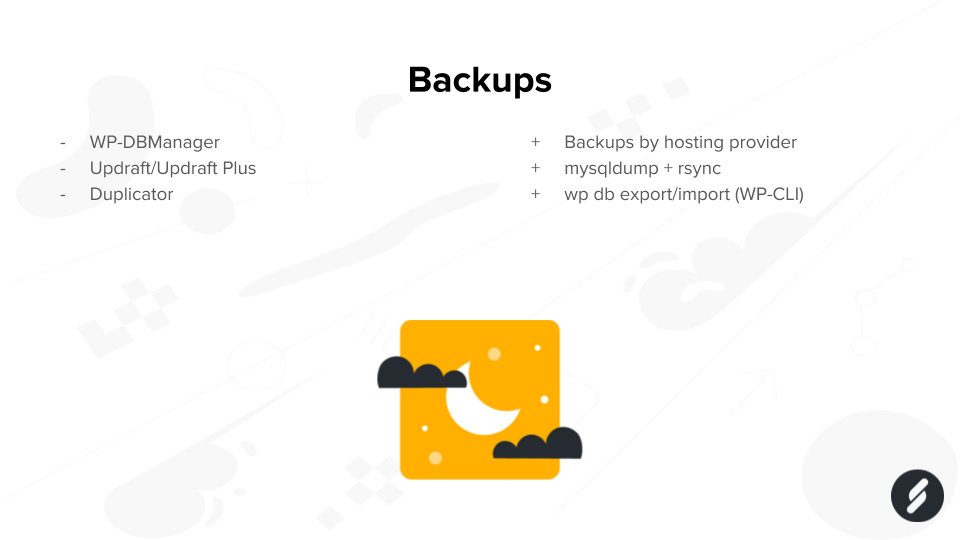
The bad
- WP-DBManager
- Updraft/Updraft Plus
- Duplicator
The alternatives
- Backups by hosting provider
- mysqldump + rsync (command line)
- wp db export/import (WP-CLI)
Backups tin exist really difficult to set up. We've seen many cases where backup plugins have completely "frozen" websites, causing them to non respond at all. The all-time way to do backups is always server-side, if it's washed in a style that doesn't touch the web- and database services.
Traditional server-side programs similar mysqldump/mysql and rsync are built for performance from start. Employ them as intended! Also, recent versions of WP-CLI has excellent features for consign/import of databases.

The bad
- AddThis
- ShareThis
- Social Media Share Button (+others)
The alternatives
- Functions from social networks
- MashShare
Social media, or sharing plugins, have a tendency to include extremely much external code and functions. Many of them also don't respect website visitors privacy (and sell data about your visitors to 3rd-party). These plugins besides tend to match the "practise it all" mentality.
If you want your website visitors to share your content, use the functions readily available with the social networks that you lot use. Cheque the developer documentation with Facebook, Twitter and similar. And if you really have to use a plugin, use MashShare.
Translations
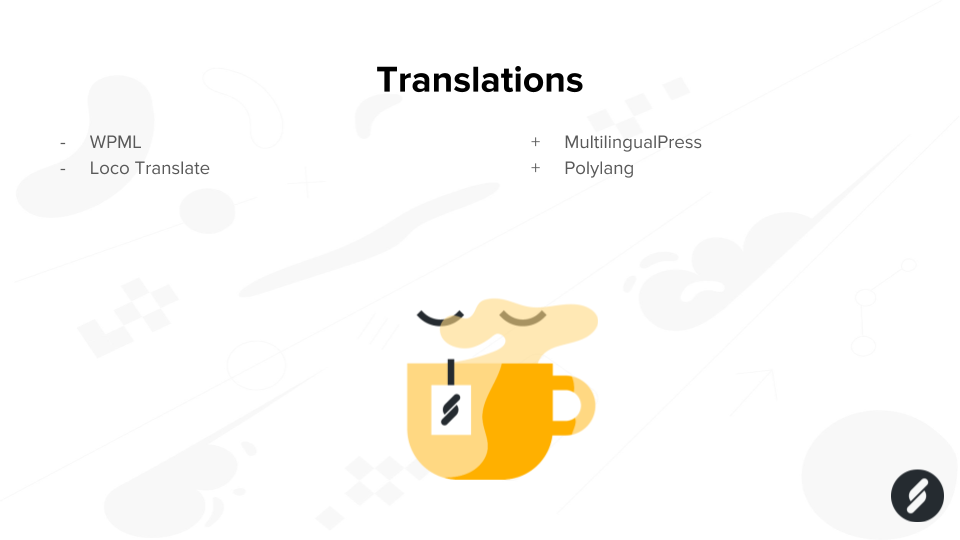
The bad
- WPML
- Loco Translate
The alternatives
- MultilingualPress
- Polylang
- Plain Multisite install
The multi-lingual support of WordPress has slowly become better with the years, and nosotros'll probably see full translation support included in WordPress cadre in the time to come, simply until then much of this functionality is solved using plugins.
If you need to become multi-lingual, don't use WPML. That'south the best advice I can requite you here. Both MultilingualPress and Polylang are ameliorate alternatives. Just don't utilise WPML.
Cache and optimization
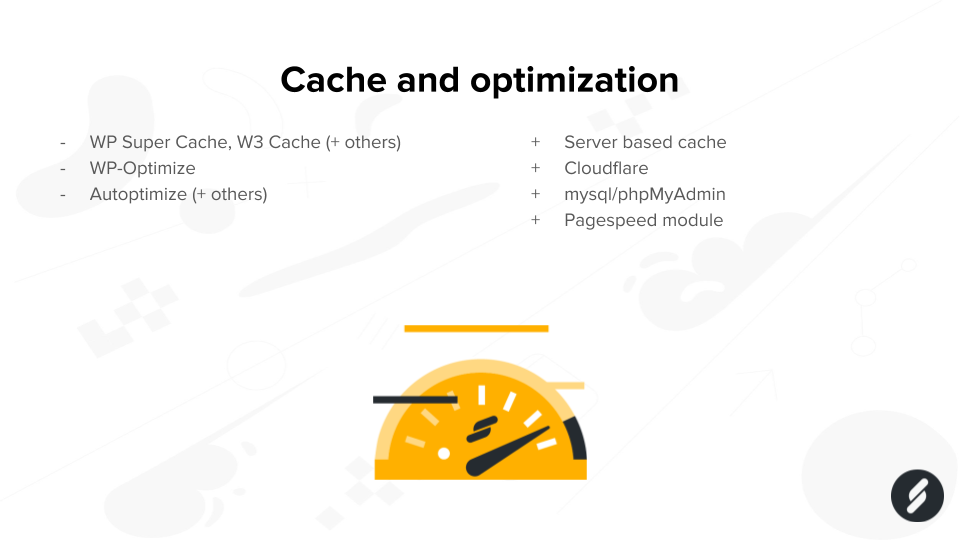
The bad
- WP Super Cache, W3 Full Cache (+others)
- WP-Optimize
- Autoptimize
The alternatives
- Server based cache
- Cloudflare Edge Enshroud
- mysql/phpMyAdmin
- Pagespeed module (mod_pagespeed)
If yous've read any of the articles previously written past my colleagues at Servebolt, you lot know that nosotros aren't large fans of using cache for optimization. That's not how cache is supposed to exist used. It's much better to focus on the code rather than the cache.
Cache plugins speed upward the requests that is cached, but slow down the requests that are not cached. Since a regular cache striking rate is somewhere between ten and 25% a cache plugin volition slow down the site for 75-ninety% of your visitors.
If you notwithstanding need cache, use a server-based cache solution. Another expert culling for caching of static resources (images, scripts and like) is Cloudflare. And for optimization of database and scripts, use the proper server-side tools instead of adding more than code to WordPress.
Really unnecessary plugins
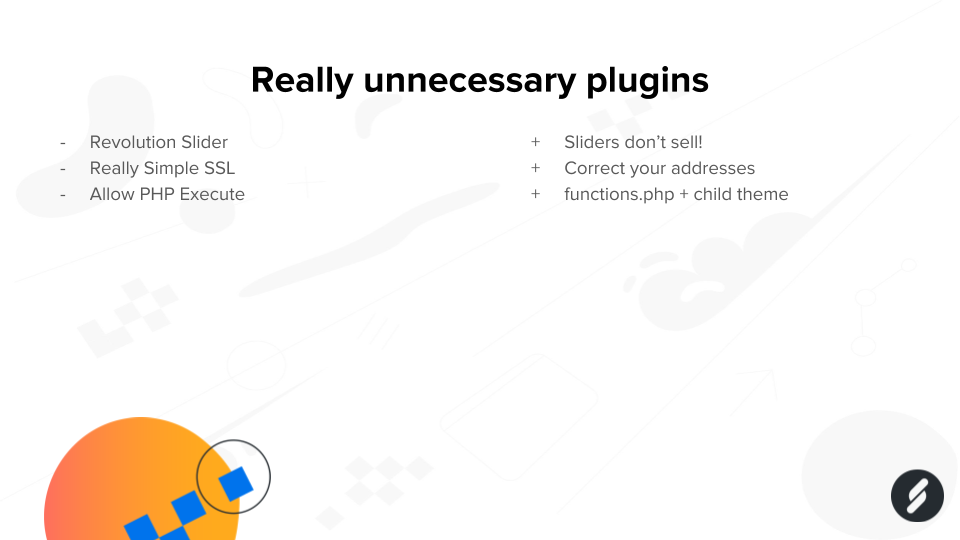
This final category really shouldn't need any explanation.
Don't use the Revolution Slider plugin if you desire operation with WordPress.
The same matter applies with Really Simple SSL (which merely is necessary for broken WordPress installations). Information technology's more than enough to update the site_url and home_url, and do a search replace with http://yourdomain.com with https://yourdomain.com.
With WP-CLI doing a search supercede doesn't even need an additional plugin. You can just run the wp search-replace command, and you lot're good to go:
wp search-supervene upon http://yourdomain.com https://yourdomain.com --all-tables Don't use the Revolution Slider plugin if you desire functioning with WordPress.
And plugins that allow custom PHP execution within WordPress are usually both negative for performance likewise as a huge security chance. Employ functions.php for your theme, setup a child theme, or brand a custom plugin. That'south how custom PHP is supposed to be managed with WordPress.
If you know anything about performance with WordPress, you're probably missing one plugin here. Yeah, we all know most it. Nosotros've all used it at some time. Information technology's one of the well-nigh downloaded WordPress plugins and it'south developed by Automattic.
What well-nigh Jetpack?
Jetpack is not the best performing WordPress plugin out there. Just I haven't included it in my list of bad plugins since Jetpack has become better, much meliorate with time.
Nowadays, it'south modular and you lot can use just certain features that y'all want.
Would I install and utilise Jetpack? No, I would not. Only I won't approximate those who practice, if they actually "must accept" it and have evaluated the alternatives. Practice your homework with Jetpack!
Sign up for our newsletter!
Receive updates from our web log, likewise equally announcements about new services in your inbox.
It's the easiest style to stay up-to-appointment to Servebolt news.
Spam gratuitous, of class.
Final words on troubleshooting plugins
WordPress plugins fail. They interruption websites, adds security holes and causes issues. But we still use them, nosotros withal need them and love them. Luckily for us at that place are many ways to resolve issues with plugins, both inside and outside of WordPress.
Inside WordPress
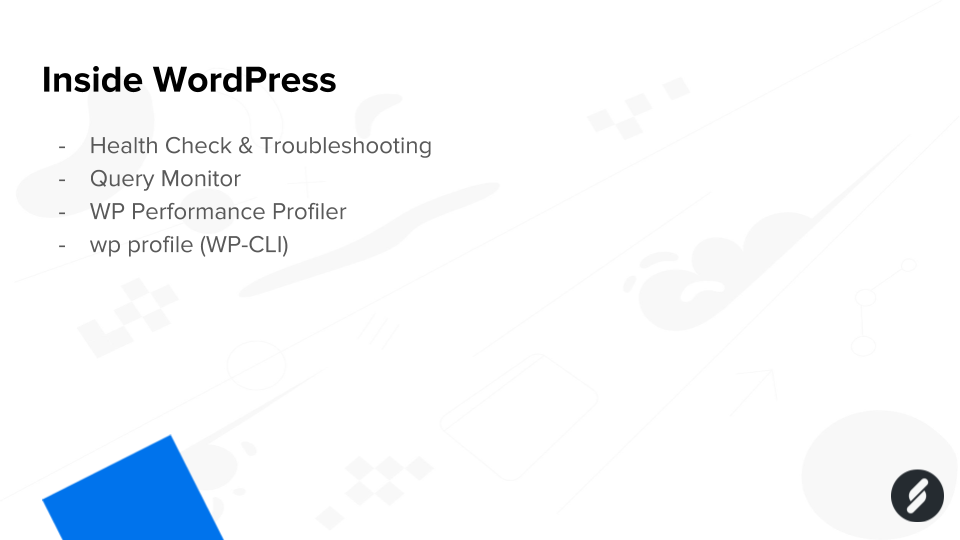
The Health Cheque & Troubleshooting plugin is awesome. It's then awesome that information technology will soon be a part of the WordPress cadre. With information technology, it'south easy to test plugins and themes on a WordPress site without the visitors even noticing it and much more. Check information technology out if you haven't already.
The Query Monitor and WP Performance Profiler plugins are also great for troubleshooting plugins. And with wp contour in WP-CLI, information technology'south really easy to profile and analyze everything that loads in a WordPress website. Be sure to check it out also!
Exterior WordPress
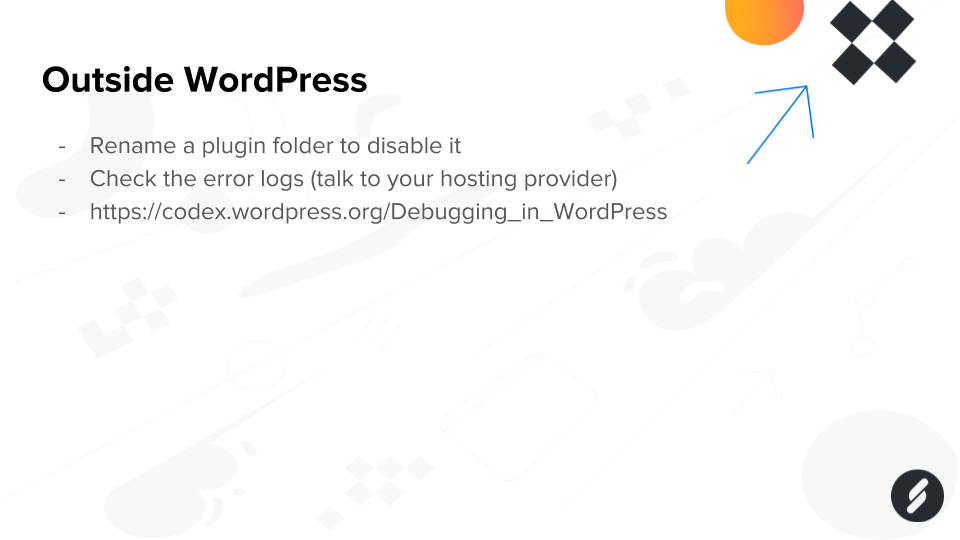
Did a plugin break your site? Rename the folder of the plugin (through SSH/SFTP, check the wp-content and plugins folder) to disable it. It'southward the oldest fob in the book, simply it all the same works.
Of course, plugins can as well easily exist installed, activated and removed through WP-CLI.
WordPress has a congenital-in debugging mode that's easily activated through wp-config.php. And many hosting providers, such as Servebolt, can give you access to the error logs direct on the server. Many times the cause of faulty plugins are listed in clear text there.
And a final note on errors, brand sure to fix even "simply warnings". If a warning occurs, PHP have to write a log find about it which in the end reduces your operation. The goal for all websites should be to have a clean error log
WordPress plugins neglect. They break websites, add together security holes and crusade problems. But we notwithstanding use them, we still demand them and love them.
Experience free to comment below if yous accept whatsoever input. Do you lot know of whatever plugins that should exist included in my list? Or do you lot think a plugin above shouldn't be included? I'd love to hear about information technology in the comments!
If you're looking into solutions that tin avert use of many types of plugins hands, you should check out Accelerated Domains. With that you lot can eliminate your employ of security, optimization and caching plugins, and supplant it with a better alternative – all in i go!
We launched Accelerated Domains!
Accelerated Domains is a service that greatly improves and optimizes your site on these iv areas: Performance, Scalability, Security, Carbon footprint.
Source: https://servebolt.com/articles/these-plugins-slow-down-your-wordpress/
0 Response to "Kalium Wordpress Support Uploading Plugins External Source"
Postar um comentário